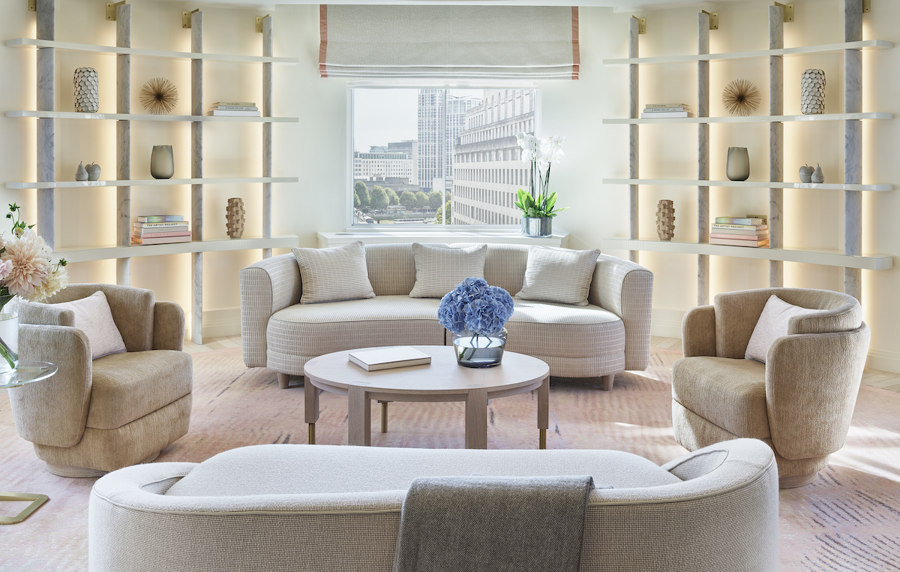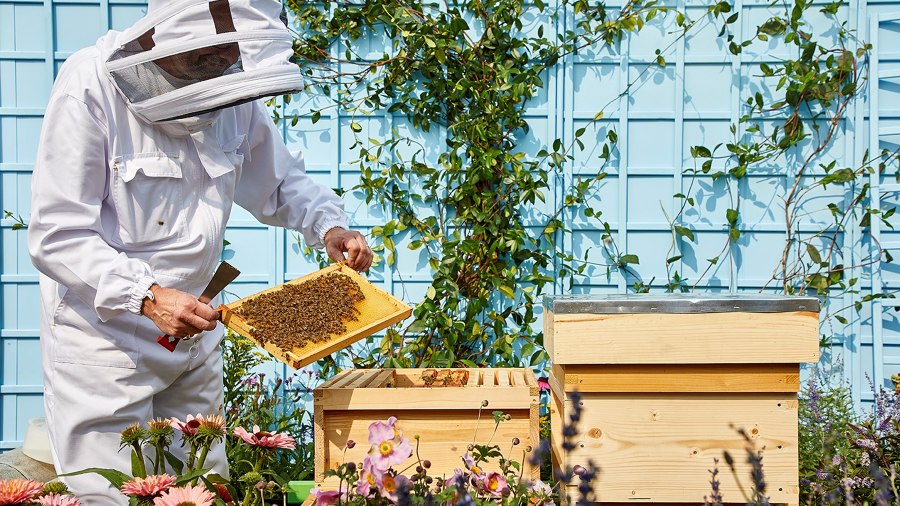A case study in sustainable hospitality: London's One Aldwych
Text by Claire Brodka
09.06.23
Janine Marshall, General Manager of the independent luxury hotel in Covent Garden, discusses what sustainability looks like at a granular level and why official accreditations can't cover every aspect of the climate responsibility complex.
Janine Marshall first joined One Aldwych as finance director in 2007. In March 2019, she stepped into the role of GM at the independent luxury hotel to spearhead a robust property renovation that included a variety of climate-conscious upgrades
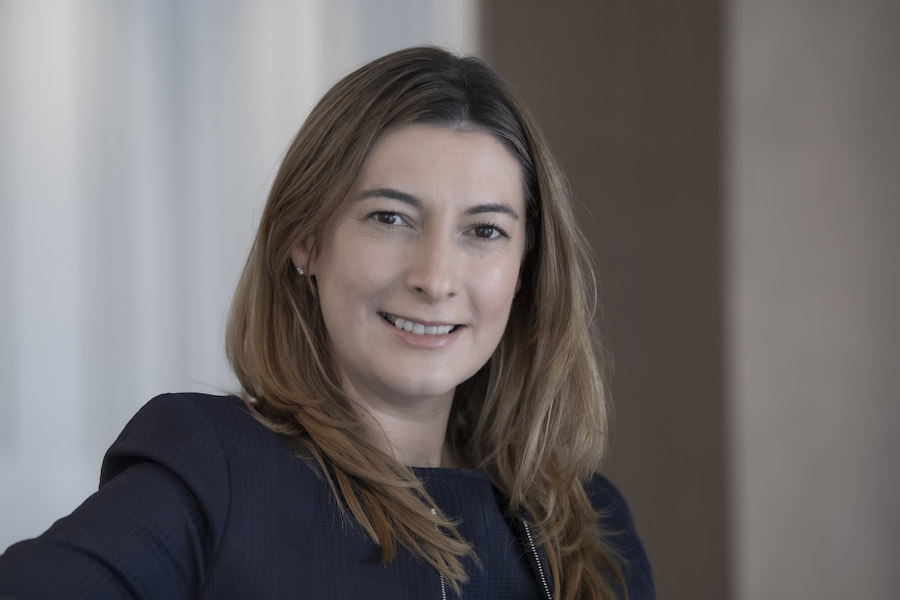
Janine Marshall first joined One Aldwych as finance director in 2007. In March 2019, she stepped into the role of GM at the independent luxury hotel to spearhead a robust property renovation that included a variety of climate-conscious upgrades
×Sustainability certifications have not paused at the altar of luxury hospitality. Just like the rest of the design world, high-end properties around the globe are increasingly put under pressure from guests and official tourist bodies to lay open their approach to combatting climate change and ensure a sustainable stay.
Living up to the sustainability task comes with a particular set of challenges when trying to offer a personalised, hyper-local and often opulent experience
Living up to this task, however, comes with a particular set of challenges when trying to offer a personalised, hyper-local and often opulent experience. Which is why many thoughtful approaches to hospitality sustainability move at a granular level rather than throwing blanket solutions at the problem.
Anglo-Frech architects Mewès & Davis (responsible for the Ritz London and Paris) were commissioned with the building in 1905, and its Grade II listing made adaptations challenging before One Aldwych officially opened its doors as a hotel in 1998
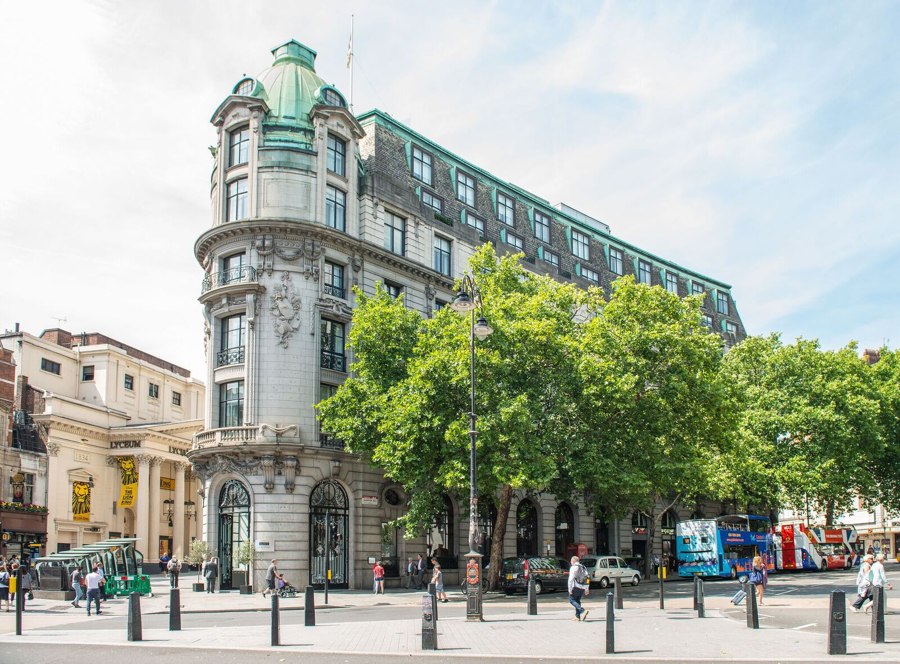
Anglo-Frech architects Mewès & Davis (responsible for the Ritz London and Paris) were commissioned with the building in 1905, and its Grade II listing made adaptations challenging before One Aldwych officially opened its doors as a hotel in 1998
×We speak to Janine Marshall, General Manager at London's One Aldwych hotel, about how the property has made sustainability part of its DNA and what measures can be taken to move toward a carbon-neutral footprint in addition to gaining official accreditations.
These days, we are surrounded by international certificates that ‘guarantee’ guests a sustainable stay. What makes these official accreditations challenging?
These official accreditations can present challenges as what works in one location of the world and/or caliber of hotel doesn't necessarily translate across the board. In the luxury space, we want to ensure that our sustainability efforts are meaningful to our guests beyond the accreditation alone, and that these efforts are relevant to the place and landscape in which we're located.
In the luxury space, we want to ensure that our sustainability efforts are meaningful to our guests beyond the accreditation alone, and that they are relevant to the place and landscape in which we're located
We aim to be authentically sustainable in everything we do (product sourcing for in-room amenities, culinary programme, etc.), and oftentimes those are beyond the requirements of the various accreditation programs. It can be difficult to communicate this level of sustainability and care to guests when they're not associated with a particular accreditation title.
'The design is light and fresh, with layers of interest to add a comfortability to the overall vibe' says designer Robert Angell of his approach for the hotel's 102 guest rooms and suites
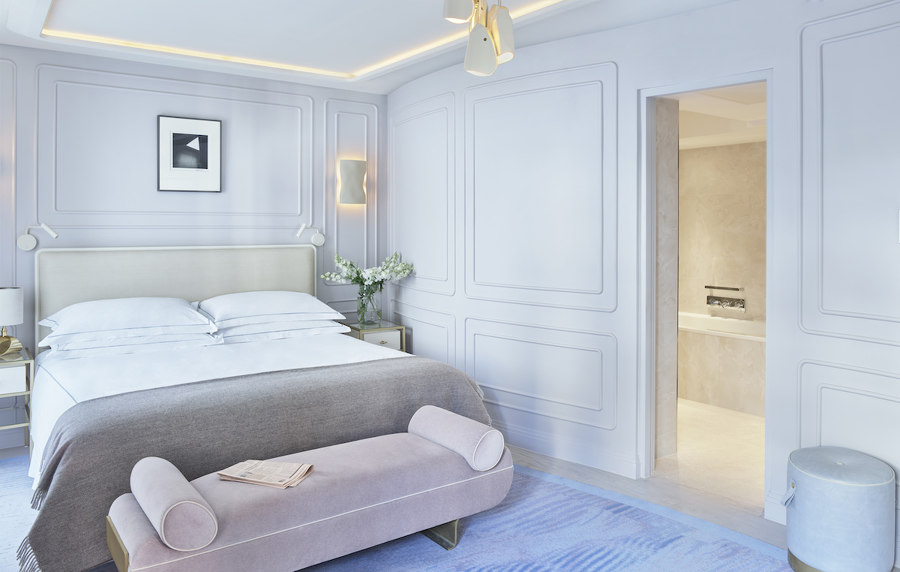
'The design is light and fresh, with layers of interest to add a comfortability to the overall vibe' says designer Robert Angell of his approach for the hotel's 102 guest rooms and suites
×Is this challenge different for the hospitality sector vs. manufacturers or brands?
Absolutely. In the hospitality sector, clients are buying into an experience rather than a product. We don’t offer cookie-cutter experiences – everything is personalised – and ensuring they remain sustainable while meeting the needs of our clientele can be a challenge. Additionally, a hotel functions very much like its own destination. That is to say, how we reduce our carbon footprint on the food in our restaurant is very different from how we do so with our gas, electricity and air conditioning of guest rooms, but it all plays into the larger picture of what we're seeking to achieve.
Which are the most credible forms of sustainability accreditation for you as a hospitality professional?
I consider Considerate Hoteliers, BCORP and Earthcheck to be the highest forms of accreditation in the hospitality sector.
Sustainability in the details: One Aldwych introduced a bee population to its rooftop and its swimming pool is chlorine-free, instead using a mineral cleaning system
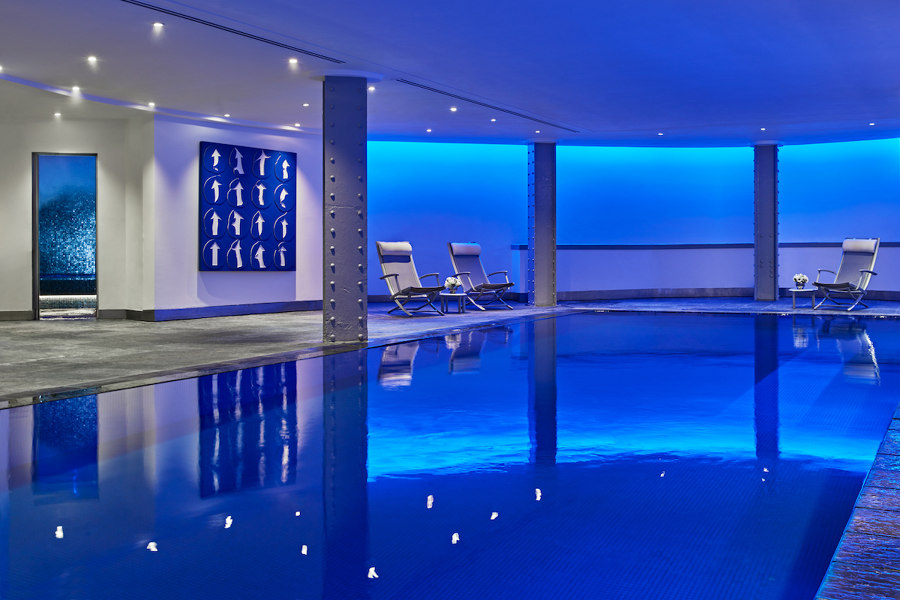
Sustainability in the details: One Aldwych introduced a bee population to its rooftop and its swimming pool is chlorine-free, instead using a mineral cleaning system
×How has One Aldwych lived up to sustainability expectations?
Sustainability is at the heart of everything we do, and has been for over 20 years. We speak to our guests and our design and brand partners to assess what’s important for them, and to them. From locally sourced goods to low-impact lighting, water and electricity, to upcycling materials and composting waste, sustainability is our promise – it's in our DNA.
Sustainability is at the heart of everything we do, and has been for over 20 years
In practice, examples of this include using natural and paraben-free SLS bathroom amenities from British-based companies or the fact that our drinking water is filtered in-house through our own hotel system using reusable glass bottles. We also introduced a rooftop garden to sustain the health of our urban bee population and use their honey throughout the property. Our swimming pool is completely chlorine-free and uses a mineral-based cleaning system and our food waste is composted on a Kent farm with vegetables grown on the plot served in our restaurants – it's basically table-to-farm-to-table dining!
All bathroom amenities are sourced locally and EVAC units flush all lavatories throughout the hotel. 'We've learned to stop apologising for the noise' says Janine Marshall
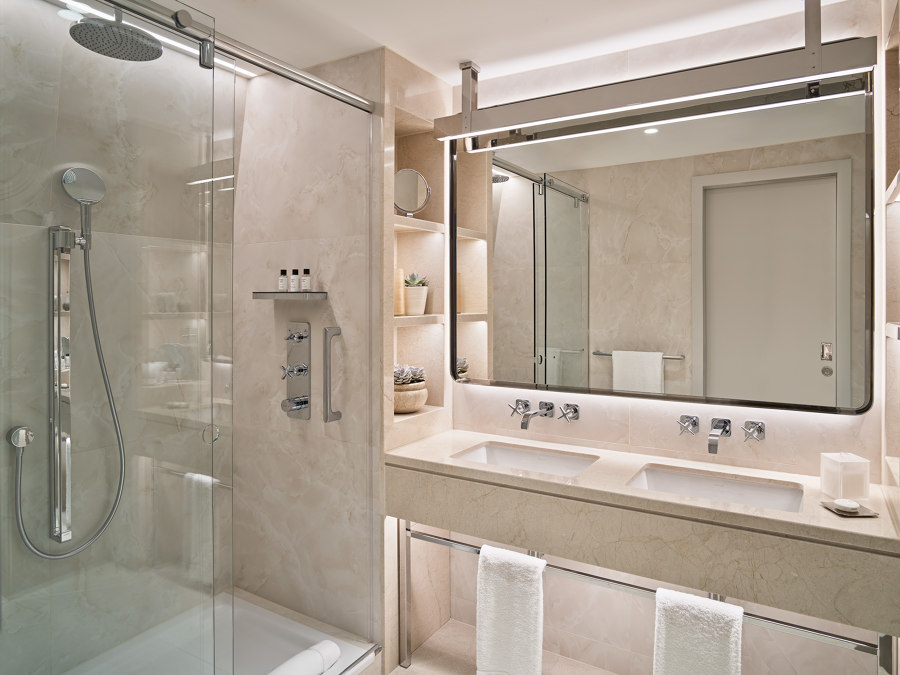
All bathroom amenities are sourced locally and EVAC units flush all lavatories throughout the hotel. 'We've learned to stop apologising for the noise' says Janine Marshall
×How does adaptive reuse factor into the equation?
Due to the historic nature of the building, you could say the hotel in its entirety is a project of adaptive reuse. But one thing I'd highlight in particular are the EVAC systems we adopted into each guest bedroom to flush all lavatories. These have been part of the building since the 60s, and rather than changing it as part of the 2019 renovation, we kept them in place due to their optimised water usage. The EVAC vacuum toilet offers up to 90% saving on flushing water compared to a standard toilet. EVAC vacuum toilets use only 1.2 liters/0.3 gallons of water per flush, compared to 4-9 liters/1-2.4 gallons per flush for dual-flush gravity toilets. As a bonus, EVAC vacuum toilets also suck 60 liters/2.1 cft of air per flush, making them more hygienic than traditional toilets.
If you could highlight one aspect of your sustainability approach, what would it be?
Our drive to source within the UK and reduce our carbon footprint (90% of our suppliers are local) is more than a desire, but a passion. It's at the heart of ensuring sustainability throughout the property. To streamline the Building Management System, the hotel has introduced Conserve – a carbon footprint monitoring system. All daily water metre readings, gas, electricity usage, room occupancy, food covers served, etc. are entered to give a monthly report of wastage. This allows the team to work out energy use per room in Kilowatts.
Restaurants throughout the property (including its Lobby Bar pictured here) place emphasis on a sustainable food sourcing policy. Produce includes fresh fish direct from the boat in Cornwall and quail from Norfolk
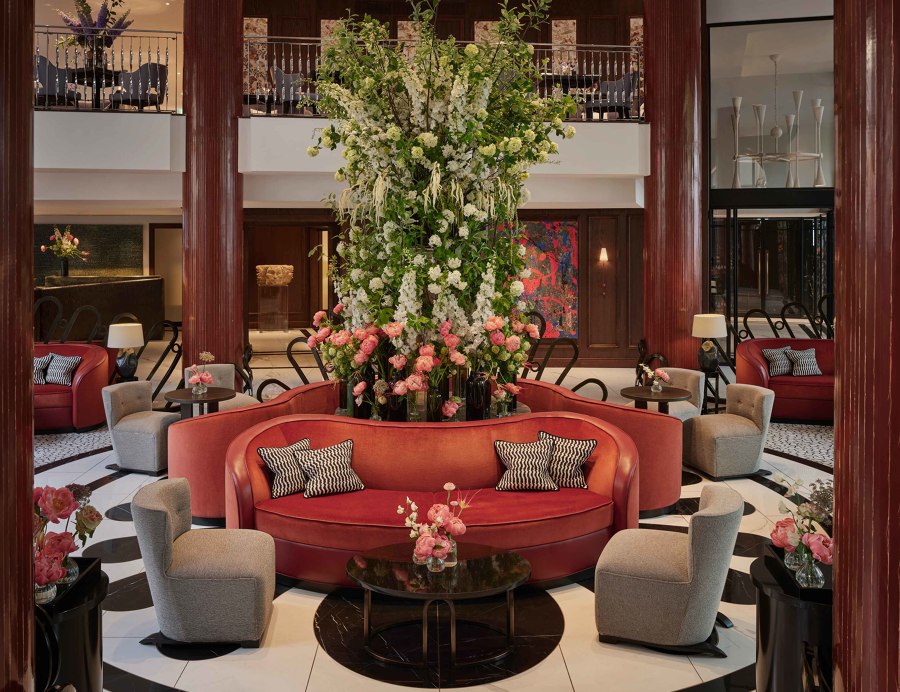
Restaurants throughout the property (including its Lobby Bar pictured here) place emphasis on a sustainable food sourcing policy. Produce includes fresh fish direct from the boat in Cornwall and quail from Norfolk
×At its best, what does a truly sustainable hotel look like?
A truly sustainable luxury hotel is carbon neutral or positive, but still able to provide pampering experiences to its guests, providing five-star service in such a way that isn’t diluted by the carbon footprint element. This often comes down to partnerships as much as system-internal processes – making sure that long-term manufacturers, designers and brands are aligned when it comes to sustainability values. Responsibility has to be taken all the way down the ecosystem, from day-to-day operations to the materials and amenities provided.
© Architonic
Head to the Architonic Magazine for more insights on the latest products, trends and practices in architecture and design.


